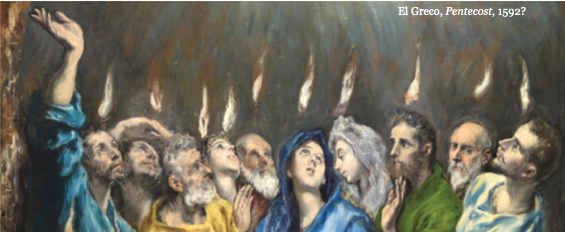
Promise Of The Future
Pentecost marks the birth of the Jesus movement that is still sweeping the world beyond the awareness of most Europeans, most dramatically in our lifetime.
It was a supernatural event, like the Incarnation and the Resurrection, neither planned nor caused by humans. Although the disciples had been told to wait in Jerusalem for the Spirit to come, they they had no idea what they were really waiting for. While foretold by the prophet Joel, it was unprecedented in human history. When it came, with tongues of fire and speaking in tongues, it could only be told in terms that offended the rational mind.
As with Christmas and Easter, this ‘irrational event’ is still marked by national holidays here in Europe where we are suppose to have ‘moved on’ from all that religious stuff – in Austria, Belgium, Cyprus, Denmark, Germany, Greece, Hungary, Iceland, Ireland, Luxembourg, Monaco, The Netherlands, Norway, Romania, Switzerland and Ukraine.
And even in France, the home of ‘rationality’! Although from 2005 to 2007, following a summer heat wave which had caught the government with inadequate health care for the elderly, it reverted to being a work day to compensate financially.
Britain, ever the exception, is missing from the list above. For some reason, Pentecost became a ‘bank holiday’ – which has meant a national holiday since the late 19th century, when British banks closed for trading while bank employees caught up on accounts. The Brits call Pentecost ‘Whit Sunday’, some say because it was a special day for baptisms when the candidates wore white gowns; while one 15th century source explained that the Holy Ghost brought ‘wyt and wysdome ynto all Cristes dyscyples’ – ‘wit’ meaning understanding.
‘Witless’
Even though most Europeans these days are ‘witless’ about Pentecost, Europe-wide celebration is most rational and appropriate. For, when you think about it, without Pentecost there would have been no Europe as we know it. Pentecost lit the fuse of the Jesus movement which over time would lay common cultural and spiritual foundations from Armenia to Iceland.
Tom Holland tells this story in his new book ‘Dominion’ which he will talk about on the first of the monthly Schuman Talks starting next week Tuesday, June 9th at 6pm (see below). [These are held at 6pm on the 9th of each month to remind us of the moment when Robert Schuman ‘lit the fuse’ for the movement towards European peace and unity, at 6pm on the 9th of May, 1950.]
Pentecost doesn’t make much sense until you have experienced it. Maybe that was the point El Greco was making when he painted himself into the Upper Room scene (in his painting above, second from right looking at the viewer) as tongues of fire hovered over the disciples’ heads. Whether or not El Greco (The Greek), the Cretan Spanish Renaissance artist greatly inspirational in Picasso’s work, actually had a personal Pentecost, I don’t know. But millions throughout history have, in Jerusalem, in Cornelius’ house and at the ends of the earth – even on an island off the coast of New Zealand.
For when I was fifteen I first encountered the Holy Spirit in this way, with ‘holy laughter’, in an old meeting tent on Great Barrier Island at the very start of what became known as the Charismatic movement. Our whole family became involved and we started a Friday night meeting in our home which began to draw people from across the city of Auckland, with up to 80 people crammed into every corner.
Unexpected
Last week I was sent a video from the pastoral couple leading St Pauls Church reminding of those days, and telling the story of how the archdeacon of this Anglo-Catholic church of ‘smells and bells’ attended our home meeting. He later wrote that when entering our living room and seeing one of his parishioners there, he felt as guilty as if being discovered in a nightclub. Soon after, as he was praying in the side chapel of his church, he found himself unexpectedly speaking in tongues. From then on, St Pauls became a centre of renewal for both Anglicans and people of all backgrounds, part of a renewal that influenced the whole nation in the 1960s and 70s.
The video, directed to the congregation, encouraged a spirit of expectation for the unexpected, as overcame the disciples in the upper room and the archdeacon in the chapel.
Obviously what happened in Jerusalem drew attention from onlookers and needed explaining. Peter told the ‘utterly amazed’ crowd (Acts 2: 7) that this is what Joel had prophesied would happen ‘in the last days’.
But Jerusalem was just the beginning. This outpouring would continue until all peoples had been reached. The fulfilment of Joel’s promise in Jerusalem was the promise of the fulfilment of the Spirit’s outpouring on ‘all flesh’.
We are now closer than ever to that goal!
Jeff Fountain
Director Schuman Centre
If you would like to support the work of the Schuman Centre for European Studies, please consider a financial gift. You can click here for more information.


This Post Has 0 Comments